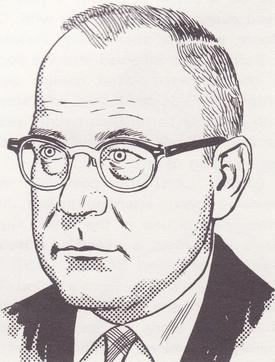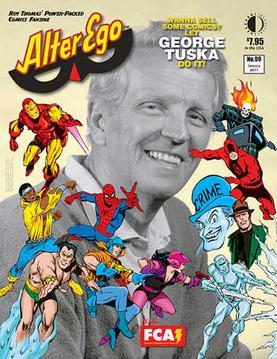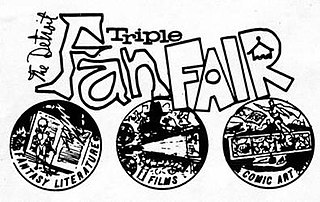Related Research Articles

Gardner Francis Cooper Fox was an American writer known best for creating numerous comic book characters for DC Comics. He is estimated to have written more than 4,000 comics stories, including 1,500 for DC Comics. Fox was also a science fiction author and wrote many novels and short stories.
The Alley Award was an American annual series of comic book fan awards, first presented in 1962 for comics published in 1961. Officially organized under the aegis of the Academy of Comic Book Arts and Sciences, the award shared close ties with the fanzine Alter Ego magazine. The Alley is the first known comic book fan award.
The Comic Art Convention (CAC) was an American comic book fan convention held annually New York City, New York, over Independence Day weekend from 1968 through 1983, except for 1977, when it was held in Philadelphia, Pennsylvania, and 1978 to 1979, when editions of the convention were held in both New York and Philadelphia. The first large-scale comics convention, and one of the largest gatherings of its kind until the Comic-Con International in San Diego, California, it grew into a major trade and fan convention. It was founded by Phil Seuling, a Brooklyn, New York City, teacher, who later developed the concept of comic-book direct marketing, which led to the rise to the modern comic book store.
Jerry Gwin Bails was an American popular culturist. Known as the "Father of Comic Book Fandom," he was one of the first to approach the comic book field as a subject worthy of academic study, and was a primary force in establishing 1960s comics fandom.
Batmania is a term coined by Billy Joe (Biljo) White in the early 1960s and the title of his influential fanzine dedicated to the DC comic book character Batman. The name is "almost certainly" a nod to the then-prominent term "Beatlemania" used to describe the impact of the Beatles in popular culture. When White first published Batmania, interest in the Batman character was at a low point; however, due to changes credited largely to DC editor Julie Schwartz, comic sales improved and the character built a wave of popularity that led to the 1966 Batman television series. White and his fanzine were credited with helping to focus the energy of the dedicated fans during this time.

Alter Ego is an American magazine devoted to comic books and comic-book creators of the 1930s to late-1960s periods comprising what fans and historians call the Golden Age and Silver Age of Comic Books.
Star Studded Comics is the name of three comics-related publications, including a comic from the Golden Age of Comics, a comics fanzine, and a modern comic homage to the previous.
William Carl Schelly was an Eisner Award-winning author who chronicled the history of comic books and comic book fandom, and wrote biographies of comic book creators, including Otto Binder, L.B. Cole, Joe Kubert, Harvey Kurtzman, John Stanley, and James Warren as well as silent film comedian Harry Langdon.
Notable events of 1966 in comics.
CAPA-alpha was the first amateur press association (APA) devoted to comic books, started by Jerry Bails in the United States in 1964.
Notable events of 1967 in comics.

The Comic Reader (TCR) was a comics news-fanzine published from 1961 to 1984. Debuting in the pre-direct market era, TCR was the first regularly published comics industry news fanzine, and was able to secure many contacts from within the ranks of the larger publishers. As TCR increased in popularity and influence, it was able to attract professional artist to illustrate the covers. TCR also proved to be a launching pad for aspiring comic book creators, many of whom published work in the fanzine as amateurs. Contributors from the world of fandom included founding editor Jerry Bails, key editor Paul Levitz, Paul Kupperberg, Tony Isabella, Byron Preiss, Neal Pozner, Don Rosa, Carl Gafford, and Doug Hazlewood.

The Detroit Triple Fan Fair (DTFF) was a multigenre convention generally held annually in Detroit from 1965 to 1977. It is credited for being one of the first comic book conventions in the United States. The Triple Fan Fair also gave balanced coverage to historic film showings and science fiction literature, in a manner that provided a template for many future convention organizers — most of which have yet to attain the same level of equal service to this sort of linked fan base.
The Dallas Fantasy Fair was an annual multi-genre fan convention held between 1982 and 1995 in Dallas, Texas. From 1989 until the show's demise in 1996, it was the home of the Harvey Award ceremonies. During its heyday, the show was one of the largest comics conventions in the country, third in attendance behind the San Diego Comic-Con and the Chicago Comicon.
Houstoncon was an annual multi-genre fan convention which was held between 1967 and 1982 in Houston, Texas. Houstoncon started out as a member of the Southwesterncon series of regional conventions, but eventually became an independent con. The founders of Houstoncon were Roy Bonario and Marc Schooley; Houston area entrepreneur Ed Blair, Jr. was also a key member of the organizing committee.
The Academy of Comic-Book Fans and Collectors (ACBFC) was the first official organization of comic book enthusiasts and historians. Active during the 1960s, the ACBFC was established by Jerry Bails, the "father of comics fandom". A vital player in the development of comics fandom, the ACBFC brought fans of the medium together, administered the first industry awards, and assisted in the establishment of the first comic book fan conventions.
A comic book convention or comic con is a fan convention with a primary focus on comic books and comic book culture, in which comic book fans gather to meet creators, experts, and each other. Commonly, comic conventions are multi-day events hosted at convention centers, hotels, or college campuses. They feature a wide variety of activities and panels, with a larger number of attendees participating in cosplay than most other types of fan conventions. Comic book conventions are also used as a vehicle for industry, in which publishers, distributors, and retailers represent their comic-related releases. Comic book conventions may be considered derivatives of science-fiction conventions, which began in the late 1930s.
Southwesterncon was a series of regional multi-genre fan conventions held annually in Texas and Oklahoma between 1966 and 1971. On a rotating basis, conventions were held in Dallas ("D-Con"), Houston ("Houstoncon"), and Oklahoma City ("Multicon"). Southwesterncon is credited with being one of the earliest ongoing comic book conventions in the United States.
Mark Hanerfeld was an American writer and editor in the comic book industry. Starting out in the world of comics fandom, Hanerfeld is most well known for co-creating Abel, the "host" of the DC Comics horror comics anthology House of Secrets, as well as being the model for the character's appearance.
References
Notes
- 1 2 3 4 Zinman, David (November 4, 1965). "Comicdom's Cult of Collectors". Newsday.
- 1 2 Schelly, Bill (June 2003). "Jerry Bails' Ten Building Blocks of Fandom". Alter Ego . Vol. 3, no. 25. pp. 5–8.
- ↑ Schelly, "Introduction," Founders of Comic Fandom, p. 8.
- 1 2 Schelly, Bill (January 2007). "The Kaler Con: Two Views: Bigger and Better than the Benson Con Just Three Weeks Before?? (Part VIII of '1966: The Year Of (Nearly) Three New York Comics Conventions'". Alter-Ego . No. 64.
- ↑ Thomas, Roy (2006). "Splitting the Atom: More Than You Could Possibly Want to Know About the Creation of the Silver Age Mighty Mite!". The Alter Ego Collection. Vol. 1. TwoMorrows Publishing. p. 99.
- ↑ "Academy Con report". Rocket's Blast and the Comicollector . No. 52. James Van Hise. 1967.
- ↑ Gabilliet, Jean-Paul (2010). Of Comics and Men: A Cultural History of American Comic Books. University of Mississippi Press. p. 265.
- ↑ Nolte, Robert (9 May 1965). "Latest Collecting Fad: Funny Thing Happened to Comics --They're Arty". Chicago Tribune.
- ↑ Feiffer, Jules (21 August 1965). "Comicon". The New Yorker . Vol. 41. pp. 23–24.
- 1 2 "1965 Alley Awards". Comic Book Awards Almanac. Retrieved December 8, 2020.
- ↑ Schelly Founders of Comic Fandom, p. 60.
- ↑ "Who Ever Heard of Jay Scott Pike!?! ["The Wonderful World of Comics 7]". Teen Titans . Vol. 1, no. 19. DC Comics. January–February 1969.
Although all previous Comicons sponsored by the Academy of Comic Art Fans and Collectors have been traditionally held during the summer months, this year's function has been scheduled to coincide with the Thanksgiving Holiday. The 1968 Academy Con will commence on November 29th and continue thru the first of December.... For further details, send a stamped self-addressed envelope to Dave Kaler....
- ↑ Thompson, Maggie (February 1968). "Academy Moribund". Newfangles. No. 7.
- ↑ Barnhardt, Adam (November 2, 2021). "Marvel Legend Roy Thomas on His Storied Comics Career, the Future of Comic Book Movies, and More". ComicBook.com.
So I helped other people, Dave Kaler and later Gary Friedrich and Denny O'Neil get into Charlton and everything, through Dick Giordano who would become the editor there.
- ↑ Cowsill, Alan; Irvine, Alex; Korte, Steve; Manning, Matt; Wiacek, Win; Wilson, Sven (2016). The DC Comics Encyclopedia: The Definitive Guide to the Characters of the DC Universe. DK Publishing. p. 217. ISBN 978-1-4654-5357-0.
- 1 2 3 "Kaler entry". Who's Who of American Comic Books 1928–1999. Retrieved 22 February 2023.
- ↑ Hahn, Joel (ed.). "1967 Alley Awards". Comic Book Awards Almanac. Retrieved January 3, 2015.
Sources
- Schelly, Bill (2010). Founders of Comic Fandom: Profiles of 90 Publishers, Dealers, Collectors, Writers, Artists and Other Luminaries of the 1950s and 1960s. McFarland.